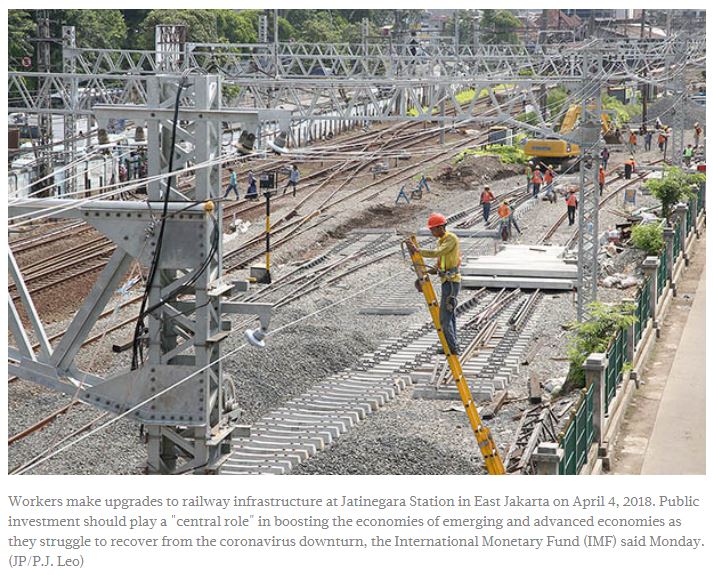Indonesia: Public investment key to COVID-19 recovery: IMF
Public investment should play a “central role” in boosting the economies of emerging and advanced economies as they struggle to recover from the coronavirus downturn, the International Monetary Fund (IMF) said Monday.
With interest rates at rock bottom around the world, the Washington-based crisis lender said now is the time for governments to take action to create jobs by reviving delayed infrastructure projects and tackling new ones, as well as by investing in maintenance.
“We are in this unprecedented situation of very low cost of borrowing, crumbling infrastructure, even in the advanced economies,” said Paolo Mauro, head of the IMF’s fiscal affairs department. “Public investment can provide that support to economic activity and job creation that is needed.”
Fund officials, especially IMF chief Kristalina Georgieva, since the start of the pandemic have been stressing the need to ramp up spending to buffer against the impact of the sharp global downturn, an unusual stance for the organization that has long preached fiscal responsibility and caution about debt levels.
But even before the pandemic, public investment “had been weak for over a decade, despite crumbling roads and bridges in some advanced economies and massive infrastructure needs for transportation, clean water, sanitation” in poorer nations, the IMF said in a report released ahead of its annual meeting next week.
With many countries still fighting off COVID-19 and many people who lost their jobs amid the pandemic looking for work, the IMF estimates that every US$1 million spent on traditional infrastructure creates two to eight jobs, while the same amount spent on research, development and green technology can create five to 14 new positions.
Boosting public investment by just one percent of GDP could create between two and three million jobs in the European Union, and nearly two million jobs in the United States, Mauro said.
Public to private
And when governments start investing more, the IMF expects the private sector to follow.
Assuming investments are of “high quality,” the IMF said increasing public investment by one percent of GDP could raise private investment by 10 percent, employment by 1.2 percent, and GDP by 2.7 percent, as well as shoring up overall confidence in the recovery.
The IMF encouraged governments to take a second look at projects that had been delayed in the past and plan new ones focused on their needs after the pandemic is over, but also encouraged economies of all sizes not to neglect existing infrastructure.
“We do have a lot of opportunities or valuable maintenance in investments, not just in poor countries. But also, in fact, even more in the advanced economies,” Mauro said.
He pointed to France, where a quarter of drinkable water pipes are at the age where they should be replaced. And the average age of US bridges is 45 years, nearing the end of their typical 50-year lifespan, Mauro said.
“There’s a lot of maintenance that would have needed to be done even aside from the pandemic. And maintenance investment is very labor intensive, it creates a lot of jobs and it can be activated very quickly,” he said.
The fund cautioned poorer countries to be careful with public investment, as they do not have as broad an access to finances as wealthier nations.
The coronavirus pandemic has caused an economic slowdown the IMF has dubbed the “Great Lockdown,” forecasting earlier this year global GDP would shrink 4.9 percent.
However, last month a fund spokesman said the outlook may be less dire than initially believed. The IMF’s updated forecast is set for release next week.
Source: https://www.thejakartapost.com/news/2020/10/06/public-investment-key-to-covid-19-recovery-imf.html


 English
English




